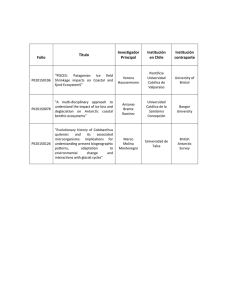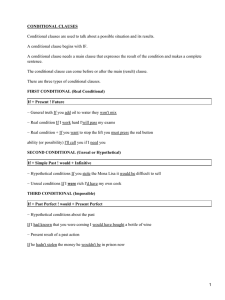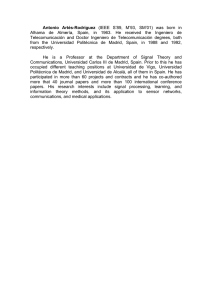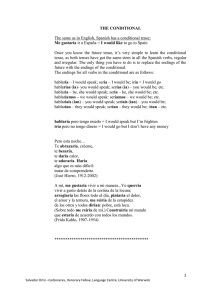PAEP conditionals 3 - Universidad TecVirtual
Anuncio
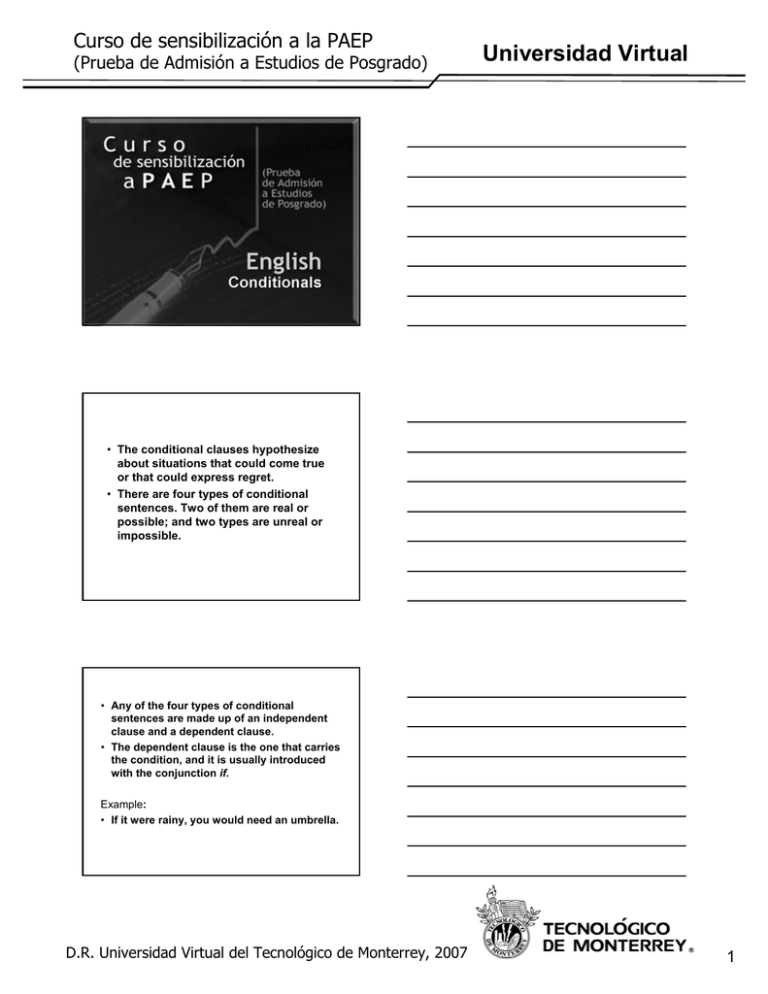
Curso de sensibilización a la PAEP (Prueba de Admisión a Estudios de Posgrado) Universidad Virtual English Conditionals • The conditional clauses hypothesize about situations that could come true or that could express regret. • There are four types of conditional sentences. Two of them are real or possible; and two types are unreal or impossible. • Any of the four types of conditional sentences are made up of an independent clause and a dependent clause. • The dependent clause is the one that carries the condition, and it is usually introduced with the conjunction if. Example: • If it were rainy, you would need an umbrella. D.R. Universidad Virtual del Tecnológico de Monterrey, 2007 1 Curso de sensibilización a la PAEP (Prueba de Admisión a Estudios de Posgrado) Universidad Virtual Use a comma between the dependent clause and the independent clause if the dependent clause starts the sentence. • If he is late, the teacher won’t let him in. Don’t use a comma if the sentence starts with the independent clause. • The teacher won’t let him in if he is late. Real First Conditional Conditional Zero Second Conditional Third Conditional Unreal • Click on any of the conditionals to find more information. • Click on the bow to end the program. Conditional zero • It refers to a condition and its consequence as a natural course of action. Example: • If you heat water, it boils. • Water boils if you heat it. D.R. Universidad Virtual del Tecnológico de Monterrey, 2007 2 Curso de sensibilización a la PAEP (Prueba de Admisión a Estudios de Posgrado) Universidad Virtual First conditional • It refers to two actions happening in the future; the second as a result of the first. Example: • If you go to the party, you’ll have fun. • If Louise gets store credit, she’ll buy a flat screen TV set. First conditional • Structure: If + subj + present tense + … , subj + future + … If he calls me, I will tell him about the conference. Or Subj + future + … if + subj + present tense + … . I will tell him about the conference if he calls me, Second conditional This kind is one of the unreal conditions. The facts are the opposite from the hypothetical situation. D.R. Universidad Virtual del Tecnológico de Monterrey, 2007 3 Curso de sensibilización a la PAEP (Prueba de Admisión a Estudios de Posgrado) Universidad Virtual • Look at the facts: • Janet is a secretary. She works in an office. However, Janet would like to be a model. • This is the hypothetical situation: • If Janet became a fashion model, she would work for important designers. Structure • The “if” clause will always take the past tense and the other clause will take would + base form of the verb. If + subj + past tense + … , subj + would + base form + …. If Janet became a fashion model, she would work for important designers. subj + would + base form + … If + subj + past tense + …. If Janet became a fashion model, she would work for important designers. • In the second conditional, when the “if” clause has the verb to be, “were” should be used regardless of the person. If I were a chef, I would love to work at the Four Seasons. He wouldn’t call home so often if he weren’t homesick. D.R. Universidad Virtual del Tecnológico de Monterrey, 2007 4 Curso de sensibilización a la PAEP (Prueba de Admisión a Estudios de Posgrado) Universidad Virtual Third conditional • It refers to a hypothetical situation in the past, which cannot be changed. • Look at the facts: • Henry didn’t go to Paris. Thus, he didn’t have the chance to visit the Louvre Museum. So, in order to express how things could have happened differently, use the third conditional: • If Henry had gone to Paris, he would have had the chance to visit the Louvre Museum. Third conditional • To express hypothetical situations about the past use the following structures: • If she had bought the dress, she would have worn it to the party. If + Subj + past perfect + … , Subj+ would + present perfect + … Or • She would have worn the dress to the party if she had bought it. • Subj+ would + present perfect + … If + Subj + past perfect + … D.R. Universidad Virtual del Tecnológico de Monterrey, 2007 5
